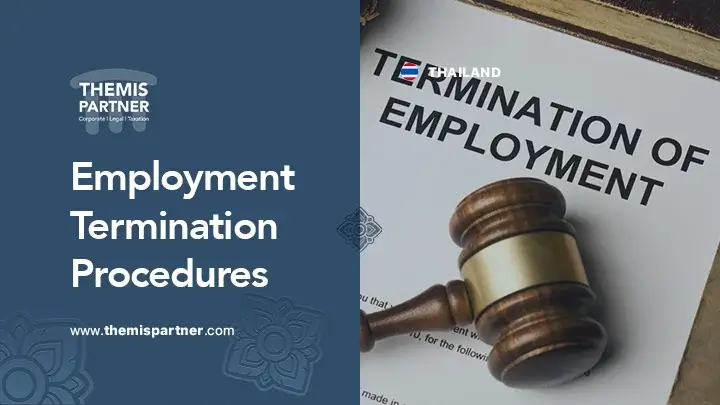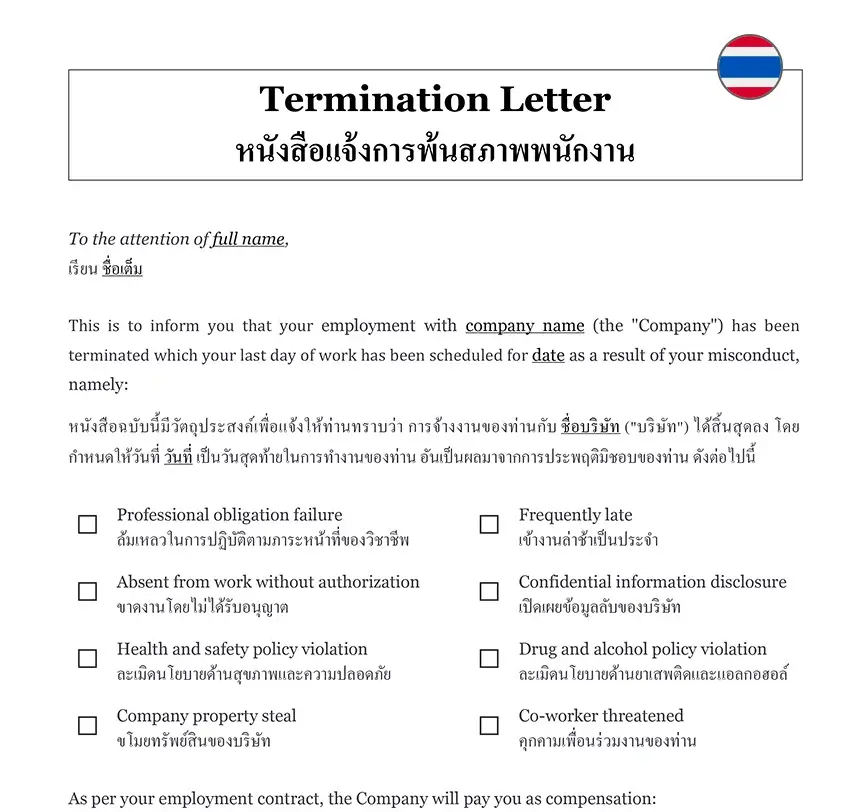Did you know that termination of employment in Thailand must follow some of the most detailed legal procedures in Southeast Asia? With stricter severance rules and new documentation requirements coming into effect for 2025, every employer faces higher compliance stakes than ever before.
Incorrect or poorly managed terminations expose businesses to risks like court-ordered reinstatement or substantial compensation payouts, even for minor procedural errors. Clear, transparent steps are essential: every action, from written notice to exit payments, is tightly defined by labor law.

For business owners, HR leaders, and professionals, understanding every step in lawful termination of employment in Thailand is more than just best practice, it is your strongest defense against costly disputes and reputational damage.
Key Takeaways
- Termination in Thailand must comply with the Labor Protection Act; no “at-will” dismissals allowed.
- Provide at least 30 days’ written notice or payment in lieu, plus severance of 30-400 days’ wages where applicable.
- Keep full documentation and pay all dues within 3 days to avoid wrongful dismissal claims.
- Employees may contest termination in Labour Court, so following fair, transparent procedures is essential.
- For foreign staff, remember to cancel work permits and notify Immigration.
Table of Contents
-
Termination of Employment Laws in Thailand
-
Grounds for Lawful Termination
-
Notice Periods & Termination Procedures
-
Severance Pay & Employee Entitlements
-
Employee Rights & Best Practices for Termination
-
FAQ: Employment Termination in Thailand
-
Conclusion
Termination of Employment Laws in Thailand
Key Thai Labor Laws on Termination
Termination of employment in Thailand is governed by the Labour Protection Act (LPA), setting strict requirements for lawful dismissal. “At-will” employment is not recognized; all terminations must meet defined legal standards.
Key statutory rules include:
- Written notice of at least 30 days, unless immediate dismissal for cause is justified
- Severance pay obligations unless termination is for statutory cause
- Distinction between dismissals for cause (serious misconduct) and non-cause (business or performance-related)
Employers must differentiate between “statutory cause” (such as dishonesty or gross misconduct) and other reasons, as only the former allows immediate dismissal without notice or severance.
Download the Employee Warning Letter to issue formal disciplinary action in compliance with Thai law.
2025 Updates & Compliance Essentials
Recent amendments emphasize stricter severance pay criteria and new documentation standards for 2025.
Employers should:
- Review updated notice periods and severance pay bands effective from 2025
- Implement detailed record-keeping and exit protocols to avoid disputes
- Monitor authoritative resources for annual legal updates
Employers who stay informed and document thoroughly minimize legal risk and protect business continuity.
Staying compliant means clear records, fair process, and continuous legal monitoring. This proactive approach supports ethical terminations and reinforces organizational integrity.
Looking to outsource HR & payroll?
Our team handle payroll, HR administration, PEO employment, and full visa and relocation support.
Grounds for Lawful Termination
Valid Grounds for Termination in Thailand
The Thai Labour Protection Act defines specific circumstances where termination of employment in Thailand is lawful and defensible.
Valid grounds include:
- Statutory cause: Serious misconduct, dishonesty, gross negligence, intentional damage, repeated failure to perform duties, breach of contract, unexcused absence for three consecutive workdays, or verified criminal conduct.
- Redundancy or business necessity: Organizational restructuring or introducing new technology can justify termination but require special advance notice and compensation.
- Performance issues: Persistent underperformance must be documented, with clear opportunities provided for improvement. Download the Employee Performance Evaluation Form.
- Probation and fixed-term contracts: Probation can last up to 119 days. Dismissal for statutory cause during this period does not require severance. Fixed-term contracts end automatically on the agreed date if terms are upheld.
A lack of clear, valid reason risks claims of wrongful dismissal and potential court-ordered compensation. “At-will” termination is not recognized in Thailand.
Wrongful Dismissal Risks & Employer Liability
Wrongful or arbitrary termination exposes employers to substantial legal risk.
Courts assess:
- Whether valid grounds existed and if the proper procedure was followed
- Sufficiency of documentation and evidence supporting the dismissal
- Compliance with notice and severance pay laws
Labor Courts frequently order:
- Reinstatement with back pay if dismissal was unlawful
- Compensation awards that consider the employee’s age, length of service, and resulting hardship
Preventive steps:
- Maintain accurate records and detailed documentation of all employment actions
- Clearly communicate the reasons for termination and follow required processes
- Involve HR professionals or legal counsel for all at-risk terminations
Learn more about recent case precedents from the Supreme Court of Thailand – Labor Cases.
Every step in lawful termination should be carefully planned, meticulously documented, and strictly compliant with Thai labor laws to reduce the risk of costly disputes and support ethical business practices.
Notice Periods & Termination Procedures
Statutory Notice Periods and Proper Dismissal Procedures
Thai law requires employers provide a minimum of 30 days’ written notice before termination, or payment in lieu, unless dismissal is for serious misconduct.
Common procedures include:
- Conducting a face-to-face termination meeting to ensure clear communication
- Issuing a formal written notice stating the specific reason and effective date
- Coordinating exit protocols, such as property return and system access removal
For collective redundancies, employers must give 60 days’ advance notice to employees and labor authorities or pay special compensation for that period.
Immediate termination without notice or severance is only permitted if there is strong evidence of statutory cause, such as gross misconduct.
Documentation & Record-Keeping for Compliance
Comprehensive records are vital in defending against wrongful dismissal claims and preparing for audits.
Key documents include:
- Signed termination letters with stated grounds
- Reviewed employment contracts and handover notes
- Evidence of procedural steps (witness statements, meeting notes)
Effective documentation can prevent disputes and support employers in court by demonstrating transparency and compliance.
Download the Employment Termination Letter to end employment legally under Thai labour law.
Severance Pay & Employee Entitlements
Calculating Severance Pay in 2025
Severance pay is required under the Labor Protection Act for most terminations not related to serious employee misconduct or statutory cause.
Eligibility depends on service length:
- Minimum 120 days’ service required
- No severance for dismissals due to statutory cause (e.g., gross misconduct or dishonesty)
2025 rules set severance rates by tenure:
- 120 days-1 year: 30 days’ wages
- 1-3 years: 90 days’ wages
- 3-6 years: 180 days’ wages
- 6-10 years: 240 days’ wages
- 10-20 years: 300 days’ wages
- 20+ years: 400 days’ wages
For employees on fixed-term contracts, severance is not owed if employment ends when the contract expires.
Employers must document reasons when severance is not paid, especially for dismissals on statutory grounds.
For a deeper understanding, read our severance pay in Thailand guide.
Final Payments & Benefits to Settle
Legally, employers must pay all outstanding entitlements within three days of the termination date:
- Accrued but unused annual leave
- Outstanding wages (including salary, overtime, and allowances)
- Bonuses earned up to termination
- Special redundancy compensation (if applicable)
Employers must also:
- Settle provident fund contributions
- Issue a withholding tax certificate
- Notify the Social Security Office
- For foreign employees: cancel work permits and inform the Immigration Bureau
A clear, documented approach to severance ensures compliance and fairness for all parties. Employers who follow these steps help maintain organizational integrity and protect against claims.
Employee Rights & Best Practices for Termination
Protections Against Unfair Dismissal
Employees in Thailand are protected by law against unfair dismissal or discrimination during termination.
Key rights and remedies include:
- Equal treatment and protection from arbitrary or discriminatory dismissal
- Written reasons for termination, ensuring transparency
- The right to contest termination by filing a claim with the Labour Court within 30 days
Recent court cases highlight that lack of evidence or procedural fairness can result in court-ordered reinstatement or compensation.
Typical outcomes from the Labour Court may include:
- Reinstatement, especially in cases lacking valid statutory cause
- Compensation based on length of service, position, and impact of dismissal
- Rulings heavily influenced by adherence to notice and severance obligations
Employer Strategies to Minimize Disputes and Legal Risks
Employers reduce risk by following clear legal processes and prioritizing fair, respectful treatment.
Best practices include:
- Using a compliance checklist for all statutory steps
- Documenting meetings, communications, and reasons for termination
- Involving HR professionals to guide communication and maintain neutrality
- Proactively engaging with labor inspectors to resolve disputes amicably
Consistent, well-documented procedures are critical in avoiding legal penalties.
To ensure compliance and reduce future claims, keep thorough records, communicate transparently, and seek legal advice for complex cases.
A clear, step-by-step process protects both employer and employee rights in termination of employment in Thailand.
FAQ: Employment Termination in Thailand
Employers and employees in Thailand face specific rules for termination, with strict requirements for severance, notice, and procedure. Understanding these core questions is essential for both sides.
Is severance required during probation?
Severance is not due if a statutory cause is proven within the probation period, which may last up to 119 days.
Must employers provide written reasons?
Yes, Thai law requires a written notice stating clear reasons, especially for cause-based dismissals.
How can foreign employees challenge dismissal?
Employees may challenge termination by filing a claim with the Labour Court, where the process and justification will be scrutinized.
For foreign employees:
- Notify the Immigration Bureau
- Cancel the work permit
- Apply all core labor standards as for Thai nationals
Employers must comply with Thai statutory procedures to avoid legal disputes and ensure fair treatment. Quick, clear documentation and timely payments help minimize conflict and support lawful employment practices.
Conclusion
Complying with Thailand’s employment termination laws ensures not only legal protection but supports a reputation built on fairness and trust.
To safeguard your business, make these essential steps part of your process: document every employment action, provide written reasons for termination, settle all payments within three days, apply a thorough review checklist, and seek guidance for complex situations.
If you need tailored advice or wish to audit your exit procedures, Themis Partner’s experienced team is ready to help you navigate Thai labor law with clarity and efficiency, contact us to ensure every step aligns with best practices.


